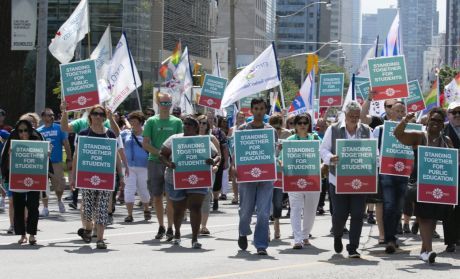Fight Ford!
You are here
Sex ed curriculum: teachers resist Ford’s bullying

September 2, 2018
In response to the ill-informed fears of his socially conservative base, Doug Ford’s reactionary Conservative government has “repealed” the 2015 Health and Phys. Ed. Curriculum—leaving teachers across the province in confusion about what they will be teaching when school starts in September. Though Ford has promised to hold a “consultation with parents,” it is unclear what form this will take, how much this duplication of government spending will cost, who will be consulted this time, and when it will happen.
The 2015 curriculum was the result of eight years of the most intensive consultation in the Ministry of Education’s history, involving thousands of people and more than 70 health-related organisations; initiated at the request of parents, it consulted more than 4000 parents from every public school in Ontario. It is unrealistic to believe that any new process will produce a usable curriculum any time soon.
In the meantime, teachers are being instructed to use curriculum from 1998—before social media, smartphones, and open discussion of LGBTTIQ rights were the norm, let alone the legalisation of same-sex marriage in 2005. This is going to be difficult, as the original documents for the 1998 curriculum (in which, for example, the word “consent” never occurs) are no longer easily available, and support materials no longer exist. Education Minister Lisa Thompson has hinted that Professional Development (PD) Days could be used to “train” teachers on the 20-year-old curriculum, another added cost that takes time and resources away from more current issues in teaching and learning. Ford has also added a snitch line, encouraging parents to target teachers adhering to the previous inclusive curriculum.
Resisting “re-training”
Many teachers resist the idea of being “re-trained” in an outdated curriculum that erases LGBTTIQ students and their concerns from common discourse, and neglects issues such as cyberbullying, online safety, consent, tolerance of diversity, sexual pleasure, and personal boundaries. Teachers wanted to know what they should do when (not if) questions about these realities in students’ lives came up in the classroom. Deputy Premier and Minister of Health, Christine Elliott, told them that although discussion of topics not covered in the 1998 curriculum could not happen in class, teachers could answer those questions privately with individual students. OECTA, the Catholic Teachers’ union, immediately advised its members “not to meet privately with students to answer questions related to sexual education,” explaining that doing so “could result in investigation by the police, CAS, and/or OCT. This may result in criminal charges and/or loss of your teaching certificate.”
Thirty school boards (representing 2/3 of all students) and another 32 legal, medical, religious, and educational organisations have issued statements of opposition to Ford’s agenda. Protests were held around the province, from Toronto to Ottawa to Peterborough. Two legal clinics have announced their intention to bring a challenge to the policy before the Human Rights Tribunal, on the grounds that reversing the curriculum discriminates against LGBTTIQ and HIV-positive students. The elementary teachers’ union has instructed teachers to use professional judgement about including some or all of the 2015 curriculum in their lesson plans, and promised legal protection to those teachers who choose to do so. Their President, Sam Hammond, points out that the Education Act requires teachers to practice equity and inclusivity, including specific mention of LGBTTIQ matters. The Standards of Practice of the College of Teachers, as well as the Human Rights Code, also require teachers to act on behalf of the safety and well-being of students, as well as to provide them with current and updated education. Teachers are therefore being put in difficult situation, where they are forced to either violate human rights law or defy the Provincial curriculum. Many teachers plan to try to resolve this contradiction.
Central to the issue is a definition of what a curriculum represents, and these definitions are split along ideological lines. To an authoritarian, a curriculum is a mandate that dictates what is and is not to be discussed in class, down to the letter, and teachers are mere implementers of this document created by authorities in the Ministry. Authoritarian social conservatives see a curriculum as a command from an authority, and falsely believe that exposing their children to knowledge about sex will push them into experimentation (studies show the opposite is true). Adhering to the tradition of censorship, most of the fears surrounding the new curriculum are baseless, coming from people who have not read the document.
A survey in 2013 found that 94 percent of Ontario parents agree that sex ed should be taught in schools. To such people, a curriculum document is not a rigid law, but rather suggested approaches to implementing flexible and contextual goals for student learning and growth. Having worked on provincial curriculum myself, I can attest that this was absolutely the spirit in which the creation of the document was approached. Curriculum can be seen as a list of the bare minimum that will be covered in a course – a definition that is often invoked by private schools who wish to retain provincial accreditation while distinguishing themselves from the “everyday” public schools from whom they are trying to steal market share. From what I have heard, teachers in Ottawa will be using this definition in September to try to ensure they are meeting all their students’ needs in a democratically inclusive way, in the absence of a curriculum and a Ministry able to do the same.
Section:









